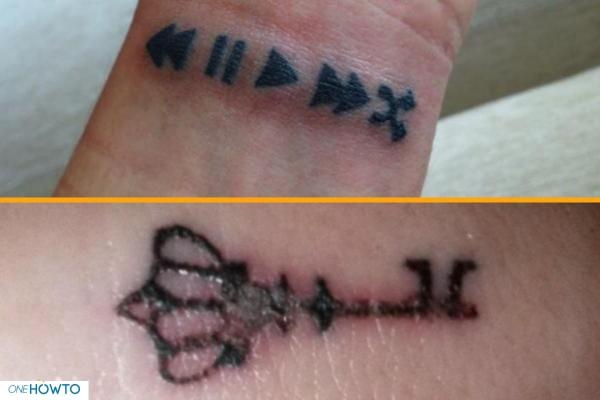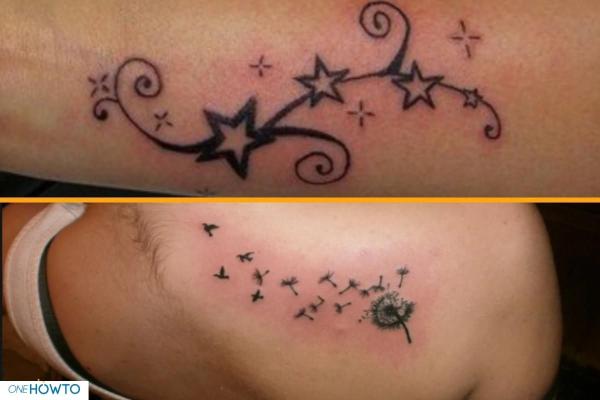My New Tattoo Is Swelling Up


Is it normal for a tattoo to be swollen? Your tattoo may appear to be swelling soon after getting it done, but it is also possible for a tattoo to look swollen for months or even years afterwards. It’s important to be careful because a swollen tattoo, especially if the area is red or painful, can be a sign of infection or other problems. In order to determine the causes and the best form of treatment, it is important to note the date that any swelling appears relative to the date of the tattoo.
Is your tattoo raised? If this is the case, keep reading oneHOWTO for guidance on why your new tattoo is swelling up, as well as why it might be swollen long after.
Why do tattoos swell up?
When you have just had a tattoo done, it is normal to have a swollen tattoo the next day or for the following 3 or 4 days. This is a natural reaction of the skin when it is pricked by a needle. For this reason, it is normal for a fresh tattoo to be a little swollen. However, if the tattoo remains swollen for days or the swelling occurs a few months after having the tattoo done, it may be an indication of something else. It could be an injury, an allergy or an infection.
Here we highlight some of the causes of badly swollen tattoos:
Tattoo swelling due to infection
The main cause of badly swollen tattoos is infection. This usually occurs days after the design is done and is generally due to a tattoo that has not healed completely. In these cases, microorganisms such as bacteria, fungi or viruses enter the body and cause inflammation of the skin. They may even cause other symptoms of infection, such as fever, muscle pain, malaise, tremors, seepage from the tattoo wounds or tough skin.
If the inflammation is caused by an infection and the swelling lasts for 3 or 4 days, or the symptoms worsen, it is essential to see a doctor. They can prescribe the best treatment specific to the nature and severity of the infection.
Here we explain how to tell if a tattoo is infected.
Tattoo swelling due to allergies
A tattoo that is swollen and itchy could also be due to a more common factor: an allergic reaction. In these cases, there is generally a reaction in the skin around the tattoo causing swelling, redness, itching, pain, and sometimes even peeling. In instances of swollen and raised tattoos where the cause is an allergic reaction, tremors, fever or general malaise are less common. These latter symptoms help us to determine if the cause of the inflammation is infection or an allergic reaction.
A dermatologist should be consulted as soon as the first symptoms appear in order to determine if the cause is really an allergic reaction. In this case, a detailed examination of the skin will rule out infection and specific treatment for the allergy can be started.
How to treat a swollen tattoo
Since there is no one cause of tattoo swelling, it is important to know the correct way to treat a swollen tattoo for each case.
Treatment for swollen and infected tattoos
Before beginning any treatment for tattoo inflammation as a result of infection, the agent or microorganism that has caused the infection must be determined. To do so, it is necessary to visit a doctor who will perform a smear test to determine the cause of the infection, e.g. bacterial, fungal or viral.
- Bacterial infection: in this case, the recommended treatment is an antibiotic ointment with bacitracin or fusidic acid.
- Fungal infection: in these cases, antifungal ointments containing fluconazole, ketoconazole or itraconazole are recommended.
- Viral infection: this is the simplest treatment since all that is necessary is to keep the infected area clean and let the virus take its course. As such, the doctor may advise that the infection can be cured without any medication.
Ointments will be able to treat mild infections. However, the doctor may prescribe antibiotics or other medication for more serious cases or those with aggravated symptoms.

Treating tattoo inflammation caused by allergic reactions
The treatment for inflamed tattoos resulting from allergic reactions is simple and involves taking antihistamines such as hydroxyzine or cetirizine. This is only if recommended by the medical specialist and if the reaction is mild. To combat more intense or severe symptoms, the dermatologist may prescribe the application of a corticosteroid cream to help reduce the swelling and itching.
In addition to these specific treatments, here are some other recommendations to relieve common inflammation in tattoos, especially if the inflammation appears just after being tattooed.
- If the tattoo is infected, use healing ointments to help disinfect the area
- Stop using moisturizing creams or lotions and avoid getting the area wet, as this will make the area damper and softer.
- Wash the tattoo properly and as often as the tattoo artist recommends. Dry the tattoo well by dabbing it with paper towels, without rubbing it.
- If the inflammation has been caused by the needle, provided you are very careful, it will disappear after 3 or 4 days at the most. If this is not the case, consult your doctor.
- Putting ice on the swollen tattoo will help to reduce the inflammation. Never apply ice directly. Use compresses or wrap the ice in a cloth and keep it on the tattooed area for 10 to 15 minutes. This will help reduce swelling for the first 24 hours and will also relieve the pain.
- Expose the infected tattoo to the open air so that it can breathe and heal faster. If you go out in the street or are in close contact with certain products, it is a better to cover the tattoo with gauze or materials recommended by a professional tattoo artist.
We advise you to take a look at this post on whether Vaseline is good for tattoo aftercare.
How to prevent the tattoo from becoming inflamed and infected
Prevention is the best form of stopping a tattoo from becoming infected or inflamed. For this, you must take the necessary care, especially after getting your tattoo done. Only by doing this will you avoid complications and allow the wound to heal. Take note of the following tips to help your tattoo heal.
Cover the tattoo
Keep the tattoo area covered during the first 2 to 4 hours after the tattoo is inked. The best way to cover it is to use plastic wrap, as this helps to increase the temperature of the wound and help retain blood and fluids, meaning that it heals faster.
Wash the tattoo
Clean the tattooed area 2 to 3 times a day for the first month (unless the tattoo is very small). Use lukewarm water and neutral soap, such as glycerin, avoiding perfumed or alcoholic soaps as they can irritate the wound and even damage the tattoo. Gently wash the area and carefully pat dry with a towel or gauze, leaving the area completely dry.
Use tattoo cream
Use antibiotic cream to reduce the inflammation during the first few days and also to help prevent infection. Consult your tattoo artist to see which healing cream they recommend for you. You can also moisturize the wound with healing creams, such as Bepanthen. Be careful with the use of any other products, such as petroleum jelly.
Be careful in the shower
Although you can shower from day one, it is important to be careful with your tattoo. Avoid getting soap or shampoo directly on the tattoo and do not rub the tattooed area with a towel when drying it. Likewise, you will not be able to bathe during the first 3 weeks. You should also avoid swimming in the pool or the sea during the first 2 weeks, or even until the wound heals completely, since the bacteria, dirt and microorganisms in the water may cause infection.

Protect yourself from the sun
Direct sun is not good for your tattoo. In addition to causing irritation, it can also cause the color of your tattoo to fade. It is therefore recommended to avoid exposure to the sun in the weeks following and, if you do expose your tattoo, you should always use a sunscreen with a high level of protection (SPF 30 or higher).
Let the tattoo breathe
As we have already mentioned, it is good to let the skin breathe. After the first few hours, during which it should be completely covered (2 to 4 hours after tattooing), you should expose the tattoo to the open air. This lessens the impact of anaerobic microbes that can cause infections. In addition, loose clothing that does not press or squeeze the tattooed area is recommended.
Avoid scratching
It is normal that the formation of the scab causes some itching in the tattooed area. The healing process usually lasts between 1 and 2 weeks so this sensation may last for a few days. The scabs should fall off by themselves. Avoid scratching or pulling them off otherwise you will lengthen the process and may complicate the healing of the tattoo.
If you are careful in caring for your tattoo it will heal quickly and, as long as you avoid exposing it to the sun or to harmful products, you will also avoid any infections. The first few days after getting a tattoo are essential for helping the wound heal, so we recommend that you follow all these steps and take careful precautions if you want to avoid long-lasting swelling.
Finally, we advise you to read this other oneHOWTO article on why your tattoo looks wrinkly.
If you want to read similar articles to My New Tattoo Is Swelling Up, we recommend you visit our Beauty & Personal Care category.






